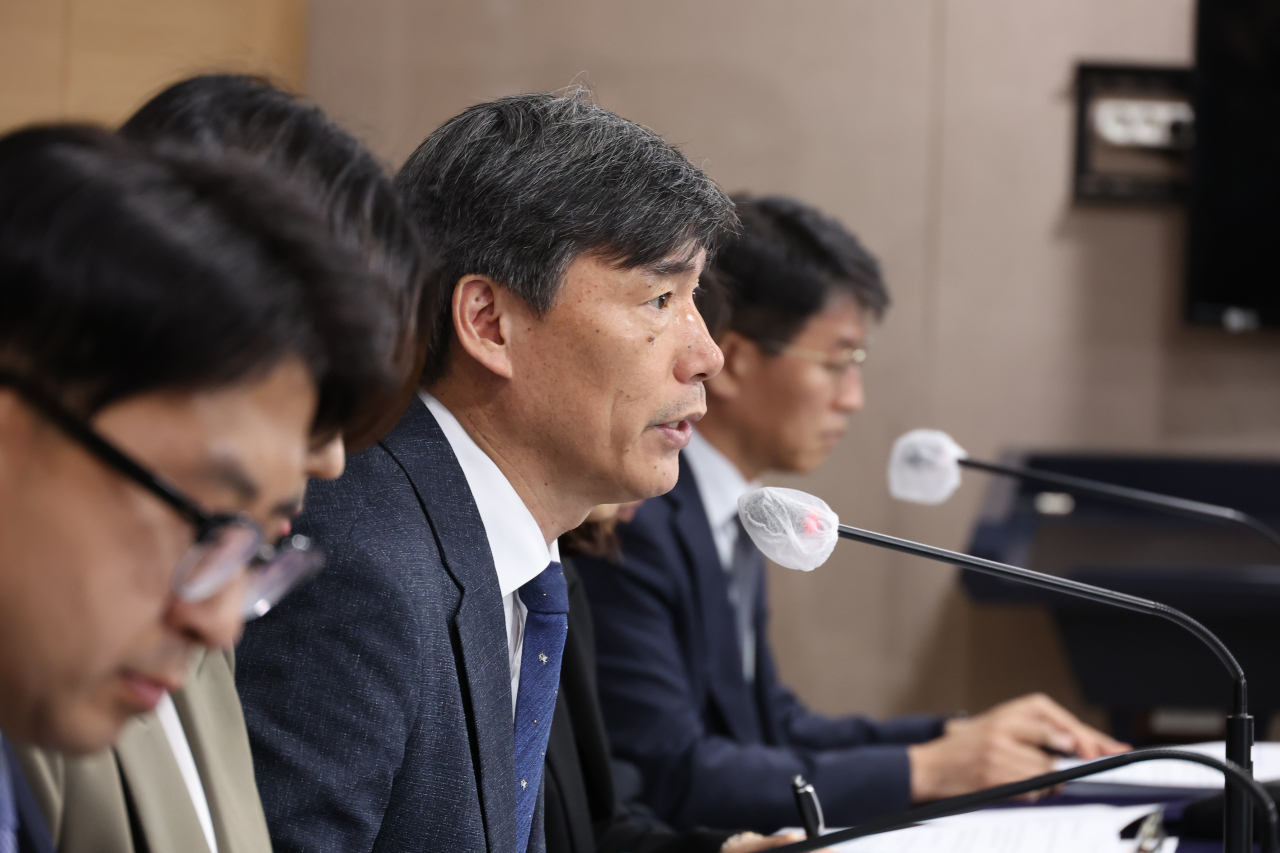 |
Park Ku-yeon (center), first vice minister of government policy coordination, speaks at a press conference at the Government Complex Seoul on Friday. (Yonhap) |
South Korea's inspection team may ask for corrective actions in case of any safety concerns over the Fukushima Daiichi nuclear plant's wastewater, which Japan aims to release later this year after treatment, though it does not have the power to enforce them, a government official said Friday.
Disagreements between Seoul and Tokyo over the facilities and raw data regarding Japan's multi-nuclide removal system during South Korea's examination later in May will be solved through bilateral talks, under which Seoul may request corrective actions.
"We will take issues with any deficiencies (in Japan's treatment of wastewater) based on our findings from the examination, so the corrective and complementary measures can be taken. However, it is not plausible to see the inspection team's examination result as having binding power," said Park Ku-yeon, first vice minister of government policy coordination, at a press conference at the Government Complex Seoul.
Park added that Seoul's 20-member team will not have superseding authority over the International Atomic Energy Agency, as the IAEA's Fukushima wastewater task force is poised to release a final assessment report in June.
For example, the inspection team will not examine samples of treated wastewater because such an action could breach the IAEA's authority to handle the matter.
"The verification process should be led by the IAEA," Park said, adding it is "undesirable" to have Seoul take the IAEA's place in its process.
Moreover, Seoul will consider the official use of the term "treated water" once the IAEA task force's assessment verifies the safety of the processed wastewater, Park added. However, confirming such issues over terminology will not be discussed during the South Korean team's inspection. Seoul officially calls nuclear-contaminated water "wastewater," and has denied rumors that it was considering the adoption of the term "treated water."
Park also downplayed the possibility of private sector experts being included in the inspection team. The members of the inspection team will be confirmed later on Friday after working-level discussions between the foreign ministries of Seoul and Tokyo.
The briefing came as plans to dispatch the inspection team was unveiled in the latest Seoul-Tokyo summit earlier this week. The team is to examine Japan's process to treat some 1.3 million metric tons of contaminated water before its discharge more than a decade after a massive earthquake and tsunami hit eastern Japan and led to nuclear power reactor meltdowns.
The examination, which will last for at least two days, will enable Seoul to conduct a safety review and analysis over the impact of the discharge on neighboring countries including Korea, Park said. However, he did not confirm the timing of when the analyses would be disclosed to the public.
Park said there will be "no discrepancies" between the indication of the IAEA task force's final report and that of Seoul's own inspection team, in apparent hopes that Tokyo would act upon Seoul's request for corrective actions.
Seoul has been facing mounting criticism over the viability of its inspection team. On Wednesday, Rep. Yangyi Won-young of the main opposition Democratic Party of Korea said in a statement that the inspection team's trip was aimed at justifying Japan's assessment of the wastewater's safety.
Also in the spotlight is the discrepancy between Seoul and Tokyo on the inspection team's purpose. Japanese Industry Minister Yasutoshi Nishimura said Tuesday that the purpose of the inspection is "not to evaluate or certify the safety of treated water," in response to Seoul's argument that what the inspection team's purpose was "certification" of the wastewater's safety.
Meanwhile, Park said it's unlikely that Seoul will lift its import ban on seafood from the quake-hit area in Japan as a result of the inspection team's findings. The ban is unrelated to Japan's imminent release of treated wastewater, he said.
Korea is one of 11 countries whose experts have joined the IAEA task force to assess the safety of the nuclear-contaminated water for release. It is the first out of 11 member countries to carry out a solo state-led inspection. Taiwan has conducted its own field inspection, as it does not have a representative expert on the IAEA task force.







